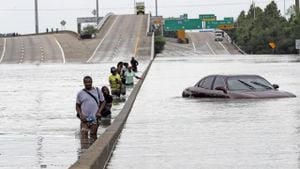Ukraine’s recent push to bolster its military ranks has led to the implementation of new contracts aimed at encouraging youth participation, amid the continuing conflict with Russia. According to Pavel Palisa, Deputy Head of the Office of the President of Ukraine, the initiative primarily targets young individuals aged 18 to 24, allowing them to enlist voluntarily without the constraints of mandatory mobilization. "This contract allows people who are not subject to mobilization to voluntarily join the Armed Forces," stated Palisa during an interview with 24 Kanal.
The program is part of Ukraine’s broader strategy to fill numerous vacancies within its military, as the country strives to maintain its defense capabilities against persistent aggressions from Russia. Significantly, Palisa indicated this new approach is not solely focused on military personnel aged 18 to 24 but aims to provide choices to potential recruits from various demographics. This initiative follows reports from the Ministry of Defense indicating over 10,000 requests for new enlistments received through the mobile app Rезерв+ within just one week.
On the battlefield, the situation remains precarious. Reported on February 20, Russian forces launched targeted attacks on Ukraine’s gas extraction facilities. Despite these strikes primarily aimed at crippling Ukraine's energy infrastructure, Naftogaz, the national gas company, confirmed no workers were harmed during the assaults. Roman Chumak, the head of Naftogaz, emphasized the company’s swift response to repair damages and restore functionality to affected sites. "The situation is controlled. The main thing is no workers were harmed," he declared, reinforcing the company’s commitment to maintaining gas supplies amid the assaults.
Chumak highlighted the importance of energy security, especially during such turbulent times. He stated, "Energy security today is more important than ever before. And it has never required so much effort and investment to protect and restore." This message is echoed by the government's push to assure all categories of consumers—including households and businesses—will continue to receive gas without interruptions.
Internationally, the conflict has drawn significant attention and support from European leaders. Following recent discussions, they have reiterated their commitment to assist Ukraine against Russian aggression, emphasizing the need for continued military aid and stricter sanctions. During meetings held on February 22, leaders, including German Chancellor Olaf Scholz, defended President Volodymyr Zelensky, countering narratives from critics like former U.S. President Donald Trump, who accused Zelensky of exploiting American resources. Scholz remarked, "For me, it is absolutely clear... Ukraine is a democracy. Putin's Russia is not," emphatically reaffirming support for Ukraine’s sovereignty.
Further addressing the sanctions, Estonian Prime Minister Kristjan Mihal reinforced the necessity of aggressive economic measures against Moscow, stating, "Sanctions and tariffs on all types of Russian energy must be very strong." These discussions point toward enhanced international coordination aimed at undermining Russia’s economic foothold, as countries evaluate their trade relationships with Moscow, highlighting the alignment of multiple nations on this front.
Besides the public support from European leaders, there is also internal momentum within Ukraine to galvanize youth engagement through educational and voluntary programs. The new enlistment framework is positioned as not only being beneficial for military readiness but also as providing young Ukrainians with viable paths for civic engagement and career development.
With tensions mounting, these mobilization efforts and international backing demonstrate Ukraine’s resilience and determination to defend its territory and maintain public morale. While the economic impact of the conflict continues to challenge both nations, the multifaceted strategies being employed reflect both nations' complex realities, as Europe stands firm alongside Ukraine against external pressures.
Overall, the narrative draws parallels between local actions and international responses, emphasizing the broad scope of issues involved. The multifaceted nature of the conflict—from mobilization and energy security to geopolitical alliances—resonates deeply within the larger framework of contemporary global affairs.



